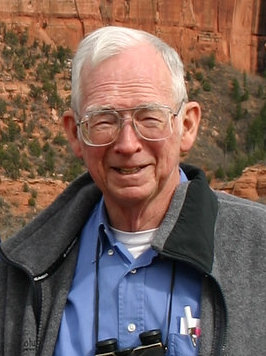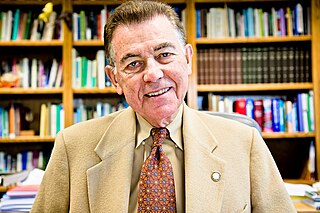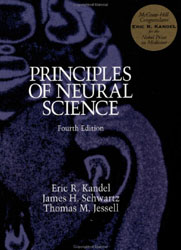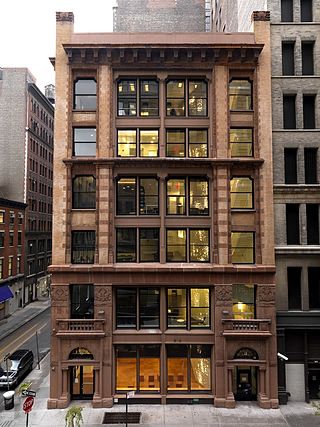
Eric Richard Kandel is an Austrian-born American medical doctor who specialized in psychiatry, a neuroscientist and a professor of biochemistry and biophysics at the College of Physicians and Surgeons at Columbia University. He was a recipient of the 2000 Nobel Prize in Physiology or Medicine for his research on the physiological basis of memory storage in neurons. He shared the prize with Arvid Carlsson and Paul Greengard.
The Gifford Lectures are an annual series of lectures which were established in 1887 by the will of Adam Gifford, Lord Gifford at the four ancient universities of Scotland: St Andrews, Glasgow, Aberdeen and Edinburgh. Their purpose is to "promote and diffuse the study of natural theology in the widest sense of the term – in other words, the knowledge of God." A Gifford lectures appointment is one of the most prestigious honours in Scottish academia.

Michael Escott Ruse was a British-born Canadian philosopher of science who specialised in the philosophy of biology and worked on the relationship between science and religion, the creation–evolution controversy, and the demarcation problem within science. Ruse began his career teaching at The University of Guelph and spent many years at Florida State University.
Simon Conway Morris is an English palaeontologist, evolutionary biologist, and astrobiologist known for his study of the fossils of the Burgess Shale and the Cambrian explosion. The results of these discoveries were celebrated in Stephen Jay Gould's 1989 book Wonderful Life. Conway Morris's own book on the subject, The Crucible of Creation (1998), however, is critical of Gould's presentation and interpretation.

Holmes Rolston III is a philosopher who is University Distinguished Professor of Philosophy at Colorado State University. He is best known for his contributions to environmental ethics and the relationship between science and religion. Among other honors, Rolston won the 2003 Templeton Prize, awarded by Prince Philip in Buckingham Palace. He gave the Gifford Lectures, University of Edinburgh, 1997–1998. He also serves on the Advisory Council of METI.
Ian Graeme Barbour was an American scholar on the relationship between science and religion. According to the Public Broadcasting Service his mid-1960s Issues in Science and Religion "has been credited with literally creating the contemporary field of science and religion."

Francisco José Ayala Pereda was a Spanish-American evolutionary biologist and philosopher who was a longtime faculty member at the University of California, Irvine, and University of California, Davis.

First published in 1981 by McGraw-Hill, Principles of Neural Science is an influential neuroscience textbook edited by Columbia University professors Eric R. Kandel, James H. Schwartz, and Thomas M. Jessell. The original edition was 468 pages; now on the sixth edition, the book has grown to 1646 pages. The second edition was published in 1985, third in 1991, fourth in 2000. The fifth was published on October 26, 2012 and included Steven A. Siegelbaum and A.J. Hudspeth as editors. The sixth and latest edition was published on March 8, 2021.
James Robert Russell is a scholar and professor in Ancient Near Eastern, Iranian and Armenian Studies. He has published extensively in journals, and has written several books.
Nancey Murphy is an American philosopher and theologian who is Professor of Christian Philosophy at Fuller Theological Seminary, Pasadena, CA. She received the B.A. from Creighton University in 1973, the Ph.D. from University of California, Berkeley in 1980, and the Th.D. from the Graduate Theological Union (theology) in 1987.

Yohanan Friedmann is an Israeli scholar of Islamic studies.
The Faraday Institute for Science and Religion is an interdisciplinary academic research institute based in Cambridge, England. It is named after the 19th-century English scientist Michael Faraday, the pioneer of electromagnetic induction.
Caroline Walker Bynum, FBA is a Medieval scholar from the United States. She is a University Professor emerita at Columbia University and Professor emerita of Western Medieval History at the Institute for Advanced Study in Princeton, New Jersey. She was the first woman to be appointed University Professor at Columbia. She is former Dean of Columbia's School of General Studies, served as president of the American Historical Association in 1996, and President of the Medieval Academy of America in 1997–1998.

Robert Elliot Pollack is an American academic, administrator, biologist, and philosopher, who served as a long-time Professor of Biological Sciences at Columbia University.
Justin L. Barrett is an American experimental psychologist, Founder and President of Blueprint 1543, a nonprofit organization. He formerly was the Director of the Thrive Center for Human Development in Pasadena, California, Thrive Professor of Developmental Science, and Professor of Psychology at Fuller Graduate School of Psychology. He previously was a senior researcher and director of the Centre for Anthropology and Mind at the Institute for Cognitive and Evolutionary Anthropology at the University of Oxford.

Dr. Denis Alexander has spent 40 years in the biomedical research community. He is an Emeritus Fellow of St. Edmund’s College, Cambridge and an Emeritus Director of the Faraday Institute for Science and Religion, Cambridge which he co-founded with Bob White in 2006.

The Veritas Forum is a non-profit organization that works with Christian students on college campuses to host forums centered on the exploration of truth and its relevancy in human life, through the questions of philosophy, religion, science, and other disciplines. The organization, named after the Latin word for truth, aims to "create university events engaging students and faculty in exploring life's hardest questions and the relevance of Jesus Christ to all of life." The first Veritas Forum was held at Harvard University in 1992. By 2008, 300,000 students had attended over 300 forums at 100 campuses across the US, Canada, France, England, and the Netherlands. In the 2010–2011 academic year, Veritas Forums were held at over 50 institutions of higher education. Veritas Forums are available for viewing online, and the organization has published several books with InterVarsity Press.

Donald A. Yerxa is an American author, editor, and historian.
The Trotter Prize is awarded at Texas A&M University and is part of an endowed lecture series. It is awarded "for pioneering contributions to the understanding of the role of information, complexity and inference in illuminating the mechanisms and wonder of nature" and includes The Trotter Lecture which "seeks to reveal connections between science and religion, often viewed in academia as non-overlapping, if not rival, worldviews.

The New York University Department of Philosophy offers B.A. and Ph.D. degrees in philosophy, as well as a minor in philosophy and a joint major in language and mind with the NYU Departments of Linguistics and Psychology. It is home to the New York Institute of Philosophy, a research center that supports multi-year projects, public lectures, conferences, and workshops in the field, as well as outreach programs to teach New York City high school students interested in philosophy.











